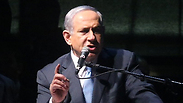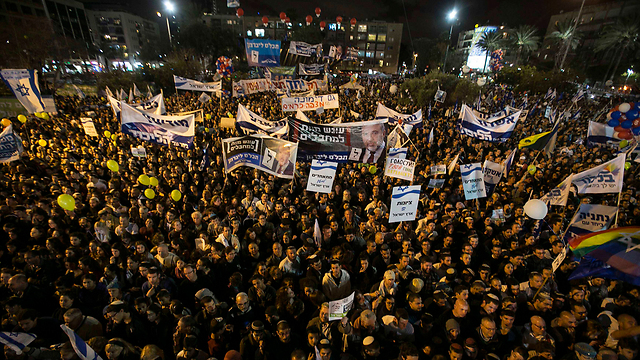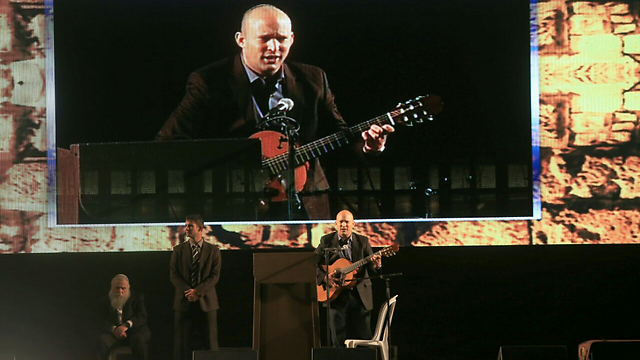
An impressive, restrained rally in the city square
Op-ed: With speakers determined not to make any mistakes and a prime minister standing behind bulletproof glass, Sunday's right-wing protest was very different from the angry demonstrations we saw in the past.
The speakers were determined not to make any mistakes, not to say a word over which they would be accused of losing the elections later on. "I hope there will be no provocations here this evening," Prime Minister Benjamin Netanyahu said at the start of his speech, "but if there are, don't get dragged by them."
Due to security constraints, Netanyahu spoke behind a bulletproof glass. The Shin Bet wouldn't take any chances: They already had one prime minister murdered at the square. But the barrier didn't do the speaker good.
The rally was completely legitimate and impressive in its own way. It was hard to assess the numbers, because the entire front part of the square is being renovated. The first rows were very crowded, almost to the point of suffocation. In the back it was pretty spacious. My estimate is that the numbers were similar to those recorded in the left-wing rally eight days ago.
The vast majority of the crowd was religious Zionist, the vast majority were men, and the vast majority came from outside. Buses belonging to the companies of the regional councils in the territories parked on Ibn Gabirol Street in double and triple parking (the transportation funding will likely be the subject of vigorous investigative reports immediately after the elections). This is mainly the crowd of the Bayit Yehudi party, large knitted skullcaps, medium-sized knitted skullcaps, boys from Zionist yeshivot, girls from religious high schools.
In the hour before the speeches, the young ones prepared to dance, the boys on one side and the girls on the other side. They danced in a close embrace, jumping high, with weariless energy, singing "Shuru, Habitu Ur'u" ("Gaze, Look and See"), one of the old songs of the Labor Movement, as if they were firing the words from an automatic rifle: "Gaze, look and see, how great this day is. A fire is burning in the chest and the plough is plowing in the field again."
The Bayit Yehudi activists placed in different parts of the square a paperboard with a picture of a smiling Naftali Bennett on it alongside a figure dressed in a T-shirt with the caption "No apologies." Instead of a head, there was a hole with a golden crown on top of it. The hole was the height of a child. People placed their children, sometimes themselves, behind the hole and took a picture. Cute. Not so educational.
There was a stand which recruited volunteers for Election Day in cities with Arab neighborhoods. I didn’t see a queue in front of the stand, but I did see the Kahanist Baruch Marzel passing by, surrounded by enthusiastic teenagers forcibly elbowing his way to the heart of the rally. Marzel at Rabin Square: Not an easy image to digest.
And there was the Holocaust memorial monument, on top of which Yisrael Beytenu activists hung two huge posters: "Death penalty for terrorists" and "Tachles Lieberman" ("Lieberman tells it as it is") with a large picture of the leader, Avigdor Lieberman, on a purple-black background. Likud activists hung a poster too ("It's either us or them. Only Netanyahu"), and so did Bayit Yehudi activists ("Stop apologizing"). There isn't a party in Israel which hasn't hung something on the Holocaust at some point. But somehow, Lieberman's poster was more irritating.
Daniella Weiss, the champion of illegal outposts in the Kedumim area, was the host. She introduced Netanyahu politely. The crowd greeted him warmly: Flags and signs were raised. Netanyahu tried to convince the audience to vote Likud, not Bennett. "As long as the Likud is in power, the National Camp will be in power," he said. "There will be no concessions." From the stage, he promised to give a senior ministerial portfolio to Moshe Kahlon (Treasury) and Bennett (Defense?). The crowd was unimpressed.
Bennett understands that Netanyahu is trying to siphon votes away from him (according to recent polls, he is succeeding). He responded with his own spin: A minute after the exit polls are published, he will create a bloc with the Likud. They will go to the president together. The audience was unimpressed by this information too.
Bennett pulled out a guitar and sang "Jerusalem of Gold" in protest of the decision made by Judge Salim Joubran, chairman of the Central Elections Committee, not to let singer Amir Benayoun perform at the rally. The crowd sang along, with quite a lot of enthusiasm. I began humming too, how could I not, until one of the veteran Gush Emunim settlers, a well-known figure, approached me and whispered in my ear: "Bennett could be a Bnei Akiva instructor in your neighborhood." I stopped singing.












